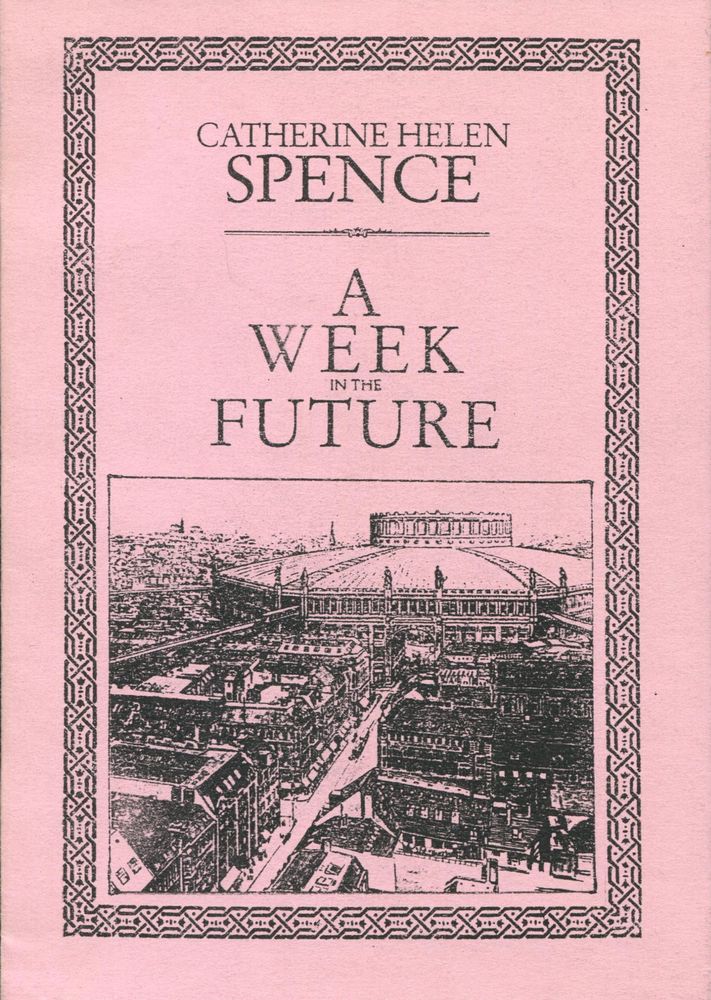 |
Littérature | Encyclopédie | Sites hébergés | Infos & actus | Association |
|
|
|
Site clair (Changer) | |
| Fiche livre | Connexion adhérent |
|
A Week in the Future
Catherine Helen SPENCE Titre original : A Week in the Future, 1889 Première parution : Australie, Sydney/Melbourne, The Centenial Magazine, décembre 1888 à juillet 1889 ISFDB APEX (France), coll. Apex international  n° 17 n° 17  Dépôt légal : 2004, Achevé d'imprimer : septembre 2004 Roman, 76 pages, catégorie / prix : nd ISBN : néant Format : 14,5 x 20,5 cm✅ Genre : Science-Fiction Ouvrage entièrement en anglais. Tirage limité à 500 exemplaires numérotés.
Quatrième de couverture
Catherine Helen Spence (1825-1910) was hailed at the end of her long life as ‘The Grand Old Woman of Australia, known for her achievements as a social reformer, essayist, journalist, preacher and advocate for electoral reform. Her philanthropic work has been justly praised, while her literary achievement is still overlooked, although her eight novels reflect a most interesting exploration of the nature of fiction. Born in Melrose, Scotland, the fifth of eight children, Spence was the daughter of lawyer David Spence (the son of a naval surgeon) and Helen (née Brodie) who came from a long line of East Lothian tenant-farmers. A prosperous existence, with cook, housemaid and nursemaid, abruptly ended when her father’s disastrous speculations in foreign wheat left the family bankrupt and in social disgrace. A Week in the Future, a utopian novella, first appeared in The Centennial Magazine (Sydney) of 1888-89 and speculates about life 100 years into the future. In A Week in the Future, quite implausibly, a sixty-two-year-old Adelaide spinster called Emily Bethel (recognisably Spence) is mysteriously transported to the London of 1988 by the aid of her doctor s hypnotic powers and an unidentified potion. The narrative is enclosed within the convenient framework of a week, allowing Spence to connect a series of disparate ideas. The seven precious days and nights are filled with observations on the new social order, each being devoted to a different aspect. On the first day Emily studies the development of Associated Homes’, the new communal dwelling, and on subsequent days, ‘Cooperative Production and Distribution; ‘Childhood and Education’; 'Marriage and the Relations of the Sexes’; ‘Government and Laws’; ‘Literature and Art; Music; the Drama and Sport’. On Sunday, she studies ‘Religion and Morality'. |
| Dans la nooSFere : 87251 livres, 112067 photos de couvertures, 83685 quatrièmes. |
| 10815 critiques, 47149 intervenant·e·s, 1982 photographies, 3915 adaptations. |
| |
|
NooSFere est une encyclopédie et une base de données bibliographique. Nous ne sommes ni libraire ni éditeur, nous ne vendons pas de livres et ne publions pas de textes. Trouver une librairie ! A propos de l'association - Vie privée et cookies/RGPD |
